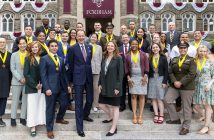In the late 1970s, Betty Lee attended Fordham at what was then the School of General Studies on the Rose Hill campus. She was studying biology and psychology when her father suddenly took ill. She had to stop taking classes to care for him.
“When you go to school it needs your full attention, and with my dad sick I just couldn’t do both,” she said.
Now, 40 years later and just a few credits to go, Lee will be wrapping up her bachelor’s degree this semester and plans to segue straight into a Master of Science in Real Estate at the School of Professional and Continuing Studies. At a time when most of her contemporaries are retiring, while plotting her next chapter—albeit one inspired by the chapter she’s just closed.
A Space for Children with Special Needs
Together with her business partner, Lee owned and operated a pediatric therapeutic services center in TriBeCa. The center had contracts with city and state agencies to provide occupational therapy, speech therapy, and physical therapy for children with special needs. In addition, they provided orthosis (braces) and other supports for children.
“Over the years we lost two leases, one we had for 10 years and another we had for eight years, but the rent doubled so we had to move out. Finally, we were fortunate and we purchased a place on Reade Street, which allowed us to have a secure place for the practice.”
Though the two recently retired from the 25-year-old center, Lee stayed on as a consultant to the new owner, who moved into a new commercial space in TriBeCa. But with COVID-19 and her lease expiring, the new owner decided not to renew her lease. She has been providing therapy services virtually and would like to reopen the center as a therapeutic gym with therapists’ offices and space for the families to socialize. Ideally, she’d like to reopen in TriBeCa, where the practice was established, though the area remains one of Manhattan’s priciest neighborhoods.
“I was going to retire, but I really wanted to go back, get my master’s, and eventually I’d like to the help the new owner get a facility,” said Lee, who currently works as an assistant to an attorney in the Wall Street area.
Given her background of renting and purchasing space in Lower Manhattan, one would think that Lee would have little need for a deeper understanding of real estate, but she said this would be the first time she conceived of the nonprofit venture from the ground up. She is hoping to help the owner get the new center up and operating with real estate expertise she will be learning at Fordham.
Understanding Construction, Financing, and Zoning
“I need to be more knowledgeable about a nonprofit building, even though I’ve learned from experience many years ago,” she said. “But now I need to know how to finance a project like that, how to do the construction, how to work with the zoning, and how to establish the facility with little financial hardship for the new owner.”
The pandemic has provided Lee with time for reflection, she said, noting that the newly vacant storefronts and sudden quiet reminded her of the days following 9/11.
“Back then, when we walked past Canal [Street] it was a different world after the attacks—like day and night,” she said.
A New Therapeutic Center for a Challenging Time
“I had the time to think about what I can do to contribute, knowing that the business is still going,” she said, adding that she finds herself in the same frame of mind now. “I really thought about how things have changed during COVID, and how I really want to be able to have something, directly or indirectly, for the families.”
She hopes the practice she helped build can be reimagined as a new kind of supportive center for children and families.
“If we can help families find a place where they can go and the children have support, then we’ve created a space for tomorrow’s leaders,” she said.
Last month, Lee was taking midterms to complete her bachelor’s. She’s taking a class on social problems in America and she was also able to take a master’s level course in real estate law that’s available to students pursuing a bachelor’s in real estate. While she said the law midterm was tough, she was later thrilled to report that she did well on her first exam in decades. But she said it was the course on social issues that steeled her resolve.
“A special needs child may need a lot of help, but I believe we should all have the support and opportunity to make things better for others,” she said. “Any mom or dad that needs us, we’re going to be there to help them out.”



